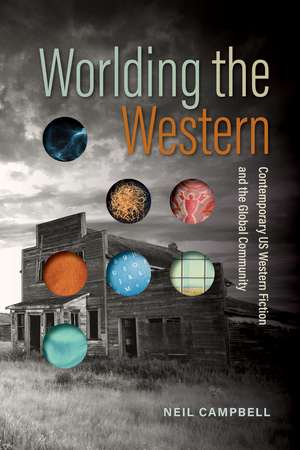Worlding the Western: Contemporary US Western Fiction and the Global Community
Autor Neil Campbellen Limba Engleză Paperback – 12 sep 2022 – vârsta ani
Diversity, disparity, and opposition are central to the dynamic frictional fiction considered in this book. The American West provides a powerful test case in which these features are present and yet, historically, have often been masked or denied in the rush toward unanimity and nation building. Worlding is, therefore, a positive, critical concept through which to view the notion of a single world under pressure.
Preț: 423.39 lei
Nou
Puncte Express: 635
Preț estimativ în valută:
81.02€ • 86.63$ • 67.55£
81.02€ • 86.63$ • 67.55£
Carte indisponibilă temporar
Doresc să fiu notificat când acest titlu va fi disponibil:
Se trimite...
Preluare comenzi: 021 569.72.76
Specificații
ISBN-13: 9781647790554
ISBN-10: 1647790557
Pagini: 272
Dimensiuni: 152 x 229 x 25 mm
Greutate: 0.3 kg
Editura: University of Nevada Press
Colecția University of Nevada Press
ISBN-10: 1647790557
Pagini: 272
Dimensiuni: 152 x 229 x 25 mm
Greutate: 0.3 kg
Editura: University of Nevada Press
Colecția University of Nevada Press
Recenzii
“This ambitious and wide-ranging text works to upend the Western and common discourses about Western American literature and representations of the American West. Campbell makes a major contribution to Western American Studies, transnational literary studies, contemporary literary studies, and a literary criticism that embraces social change and an ethic of care.”
—Nancy Cook, emerita professor of English, University of Montana, and a past president of the Western Literature Association
“Campbell is one of the leading scholars of Western American literature. One emerges from Worlding the Western recharged about the role of literature as a fundamental critique of and counter to US politics since 2016. The book will carry weight and cast a wide net of influence with the next generation of Western American literature scholars.”
—O. Alan Weltzien, professor emeritus of English, University of Montana Western, author of Savage West: The Life and Fiction of Thomas Savage
—Nancy Cook, emerita professor of English, University of Montana, and a past president of the Western Literature Association
“Campbell is one of the leading scholars of Western American literature. One emerges from Worlding the Western recharged about the role of literature as a fundamental critique of and counter to US politics since 2016. The book will carry weight and cast a wide net of influence with the next generation of Western American literature scholars.”
—O. Alan Weltzien, professor emeritus of English, University of Montana Western, author of Savage West: The Life and Fiction of Thomas Savage
Notă biografică
Neil Campbell is professor emeritus of American Studies at the University of Derby in the United Kingdom. He has published widely on the American West in articles, book chapters, and monographs. Campbell is also the author of an interdisciplinary trilogy of books on the postwar American West, Cultures of the American New West, The Rhizomatic West, and Post-Westerns. He is co-editor of the book series Place, Memory, Affect, which contains a volume he wrote, Affective Critical Regionality, and he is the editor of Under the Western Sky: Essays on the Fiction and Music of Willy Vlautin.
Cuprins
Acknowledgments
Introduction. Enter West
Chapter 1. On Worlding
Chapter 2. "What West?" Hernan Diaz's In the Distance
Chapter 3. "What World We Making?" Sebastian Barry's Days Without End
Chapter 4. "The World in All Its Workings" Téa Obreht's Inland
Chapter 5. "A Land of Missing Things" C Pam Zhang's How Much of These Hills Is Gold
Chapter 6. To Remember Otherwise and Against—Tribalography, Robin Wall Kimmerer, LeAnne Howe, and Tommy Orange
Chapter 7. "The Story and the Archive of the Story" Valeria Luiselli's Lost Children Archive
Chapter 8. Exit West—Conclusions Perhaps
Notes
References
Index
About the Author
Introduction. Enter West
Chapter 1. On Worlding
Chapter 2. "What West?" Hernan Diaz's In the Distance
Chapter 3. "What World We Making?" Sebastian Barry's Days Without End
Chapter 4. "The World in All Its Workings" Téa Obreht's Inland
Chapter 5. "A Land of Missing Things" C Pam Zhang's How Much of These Hills Is Gold
Chapter 6. To Remember Otherwise and Against—Tribalography, Robin Wall Kimmerer, LeAnne Howe, and Tommy Orange
Chapter 7. "The Story and the Archive of the Story" Valeria Luiselli's Lost Children Archive
Chapter 8. Exit West—Conclusions Perhaps
Notes
References
Index
About the Author
Descriere
Worlding the Western takes the fiction of the Western United States as a focal point for a re-examination of the consequences of exceptionalism and closed borders in the Trump Era. At a time of bounded individualism, new nativism, climate emergency, and migration crises, author Neil Campbell argues that fiction offers opportunities to put the world back in ways that challenge the dark side of globalization and proposes worlding as a different and more open form of politics.
